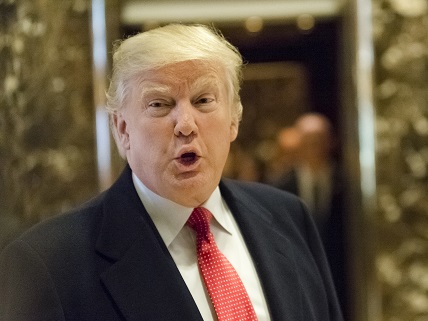The Most Potent Federal Regulatory Agency Will Answer Solely to Donald Trump
And the potential for Trump to abuse the power of the Consumer Financial Protection Bureau is huuge.

When Congress created the Consumer Financial Protection Bureau in 2011, the new regulatory agency was something of a technocratic ideal.
The bureau was given broad powers over American financial institutions, and it was designed to operate differently from all the other boards, commissions, and agencies dotting the federal landscape. With a single director unaccountable to Congress or the president and a $600 million annual budget that came directly out of the Federal Reserve (and therefore wasn't subject to congressional control), the CFPB was supposed to be a truly "independent" regulatory agency that would be able to operate outside of political influence to guide America's banks away from the threat of another economic collapse.
It could do whatever its director believed was necessary to prevent "unfair, deceptive, or abusive acts and practices" by banks.
The CFPB was unaccountable to Congress and the president—but not the courts.
A federal appeals court ruling in October changed the fundamental structure of the CFPB and will allow future presidents to have direct control over the agency that has direct control over wide swaths of the country's banking and financial sectors. Regulatory agencies headed by a single executive must be directly accountable to the president, the court observed, while independent agencies authorized by Congress—like the SEC and the FCC—must have a multi-member commission at the helm.
Practically, that means that Trump might be able to replace the director of the CFPB, Richard Cordray, before his term officially ends in 2018.
More importantly, it means Trump will be able to use the CFPB's powers for his own ends, if he wants, because the person who gets to determine whether a banking practice is unfair, deceptive, or abusive will now serve at the whims of the president.
"An objective rendering of the evidence suggests that the executive office at times uses the regulatory process to reward special interest groups by accelerating sought-after rules that prove useful to the president's political purposes while delaying rules that are less popular with interest groups," wrote Adam Smith, a professor of economics at Johnson & Wales University, and Bruce Yandle, dean emeritus at Clemson University's College of Business, in a joint op-ed this week.
Arguably, there's nothing Trump grasps about the presidency so well as he understands the power of transactional politics. He understands the importance of negotiating from a position of power and of using leverage against his opponents, both in business and politics.
For Trump, that makes the CFPB a potentially giant lever.
"It's important to remember that the CFPB can write rules that reduce the wealth of individual industries — payday lenders for example — while improving the well-being of commercial banks that offer overdraft protection service, a close substitute for payday loan customers," Smith and Yandle conclude. "If a president is more beholden to the latter group, then the CFPB can be nudged to serve the president's purposes. Or vice versa."
To be clear, it's not the federal court ruling that handed this power to Trump. The architects of the CFPB did that. October's ruling from the D.C. Circuit Court of Appeals simply dealt with the troublesome legal structure of the bureau and brought it into accord with the rest of the federal regulatory state.
Still, that ruling turned a very powerful, supposedly independent (the CFPB was never really independent, no matter what it's designers' intentions were) regulatory agency into a very powerful extension of the Oval Office.
As I wrote at the time, the court ruling "potentially creates a bunch of new problems. Most obvious is the potential for turning a powerful regulatory agency into a political pawn that can be wielded by future presidential administrations. That seems to undercut the very idea behind the creation of the CFBP—that it would be independent of political influence. Now, it will quite literally be subjected to political influence."
That was before Donald Trump was president-elect. Now, the newly restructured CFPB is another example (along with mass surveillance, extrajudicial drone killings, and "pen and phone" executive action in the face of congressional resistance) of expanded executive power being passed to Trump from the Obama administration.


Show Comments (153)